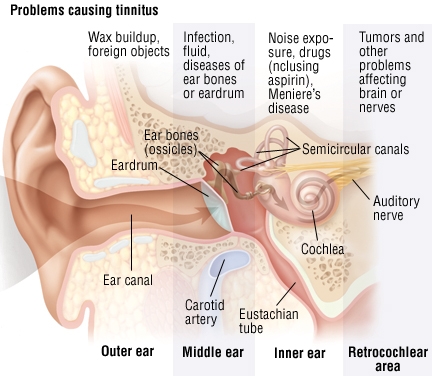
Tinnitus (from the Latin
‘ringing or buzzing in ears’). More than 360,000 Canadians suffer from tinnitus, and 150,000 of those are severely affected. Although this can affect an individual at any age, it’s most often a condition that develops with aging and often associated with hearing loss.
Symptoms of tinnitus include hearing sounds when no external sound is present. The ears may ring, click or buzz, it is constant and in many cases, can become quite unbearable to live with.
It can manifest itself in various forms: low hum, beat of the own pulse, high frequency bleep or tonal signals. Tinnitus can be felt in one ear, both ears or felt as noise in the head. In medicine this phenomenon is not considered a disease, and it usually referred as a symptom of other diseases.
Sometimes tinnitus arises temporarily after strong exertions, including noise loads. If this stress discontinues and the person has a possibility to rest in silence, tinnitus disappears. In a large quantity of cases, tinnitus is an accompaniment sign of many other diseases having nothing in common with an ear. For example, it could be:
- Vascular disorders (i.e. spasms, aneurysms, other diseases)
- Toxic side effect of drugs
- Diseases of an ear (otitis media, sulfur traffic jam)
- Metabolic Disorders (glucose metabolic disorders, hypothyroidism, hyperthyroidism, hyperlipidemia, anemia, and vitamin B12 or zinc deficiency)
- Arthrosclerosis (Unlike most other forms of tinnitus – in which only the sufferer can hear the noise in their ears – with atherosclerosis it can also be audible from outside)

The cause can be determined by the symptoms that accompany tinnitus, nature of noise, and its intensity. Monotonous nature of noise and the hearing deterioration can tell about problems related to a system of circulation of blood, or inflammation of an ear. Pulsating ringing in ears and the dependence of the noise level on pressure are most probably diseases of vessels. Continuous noise preferably in one ear with coordination disorder and an appearance of vertigo can be a symptom to a lesion of an auditory nerve. Buzzing in ears accompanying by a pain and fever can be signs of otitis media.
To accurately find out the cause of an emergence of noise, you will need to undergo several tests to make an accurate diagnosis. These may include: audiometric testing, X-rays, biochemical analyses, ultrasound, etc., of brain vessels.
Immediate treatment is prescribed in a physician's discretion only after accurate determination of the cause of tinnitus. Thus, if buzzing in ears arose as a complication after a tolerated cold disease, ear drops will be prescribed. Pulsating tinnitus is a result of hypertension, and is treated with the help of drugs controlling blood pressure. If ear noises are caused by otitis media (inflammation of the middle ear), antibiotics are prescribed.
Treatment Options in Toronto?
Treatment for tinnitus can be a challenge as it usually considered a symptom of an underlying condition. Most likely the first step is you will be sent for a hearing test and if hearing loss is noted then you will be fitted with a hearing aid. However, if this is not the case, then most other therapies are less about curing the treatment but more about modifying the patient’s response to the tinnitus sound so that it is more bearable. In this article, we will discuss places in Toronto you can go to for help.
Patients are better off ignoring the sound caused by tinnitus by focusing on something else. Reducing stress and increasing sleep can also help.

 Tinnitus (from the Latin ‘ringing or buzzing in ears’). More than 360,000 Canadians suffer from tinnitus, and 150,000 of those are severely affected. Although this can affect an individual at any age, it’s most often a condition that develops with aging and often associated with hearing loss. Symptoms of tinnitus include hearing sounds when no external sound is present. The ears may ring, click or buzz, it is constant and in many cases, can become quite unbearable to live with.
Tinnitus (from the Latin ‘ringing or buzzing in ears’). More than 360,000 Canadians suffer from tinnitus, and 150,000 of those are severely affected. Although this can affect an individual at any age, it’s most often a condition that develops with aging and often associated with hearing loss. Symptoms of tinnitus include hearing sounds when no external sound is present. The ears may ring, click or buzz, it is constant and in many cases, can become quite unbearable to live with.
 The cause can be determined by the symptoms that accompany tinnitus, nature of noise, and its intensity. Monotonous nature of noise and the hearing deterioration can tell about problems related to a system of circulation of blood, or inflammation of an ear. Pulsating ringing in ears and the dependence of the noise level on pressure are most probably diseases of vessels. Continuous noise preferably in one ear with coordination disorder and an appearance of vertigo can be a symptom to a lesion of an auditory nerve. Buzzing in ears accompanying by a pain and fever can be signs of otitis media.
The cause can be determined by the symptoms that accompany tinnitus, nature of noise, and its intensity. Monotonous nature of noise and the hearing deterioration can tell about problems related to a system of circulation of blood, or inflammation of an ear. Pulsating ringing in ears and the dependence of the noise level on pressure are most probably diseases of vessels. Continuous noise preferably in one ear with coordination disorder and an appearance of vertigo can be a symptom to a lesion of an auditory nerve. Buzzing in ears accompanying by a pain and fever can be signs of otitis media.